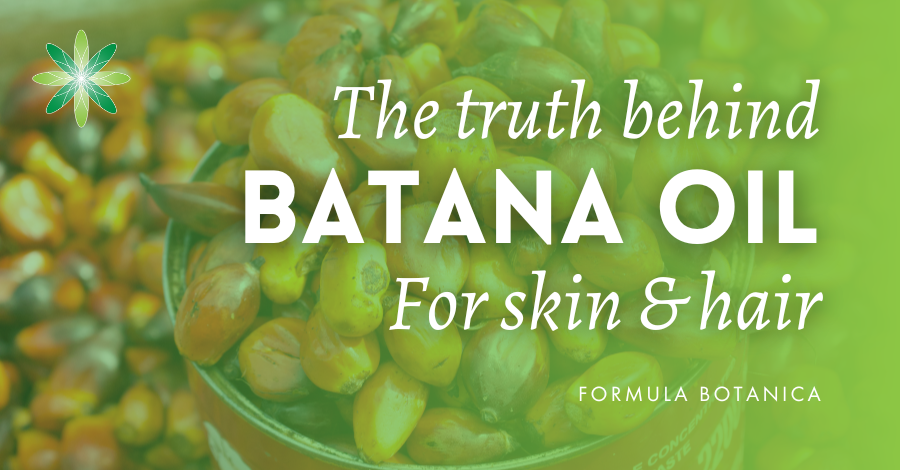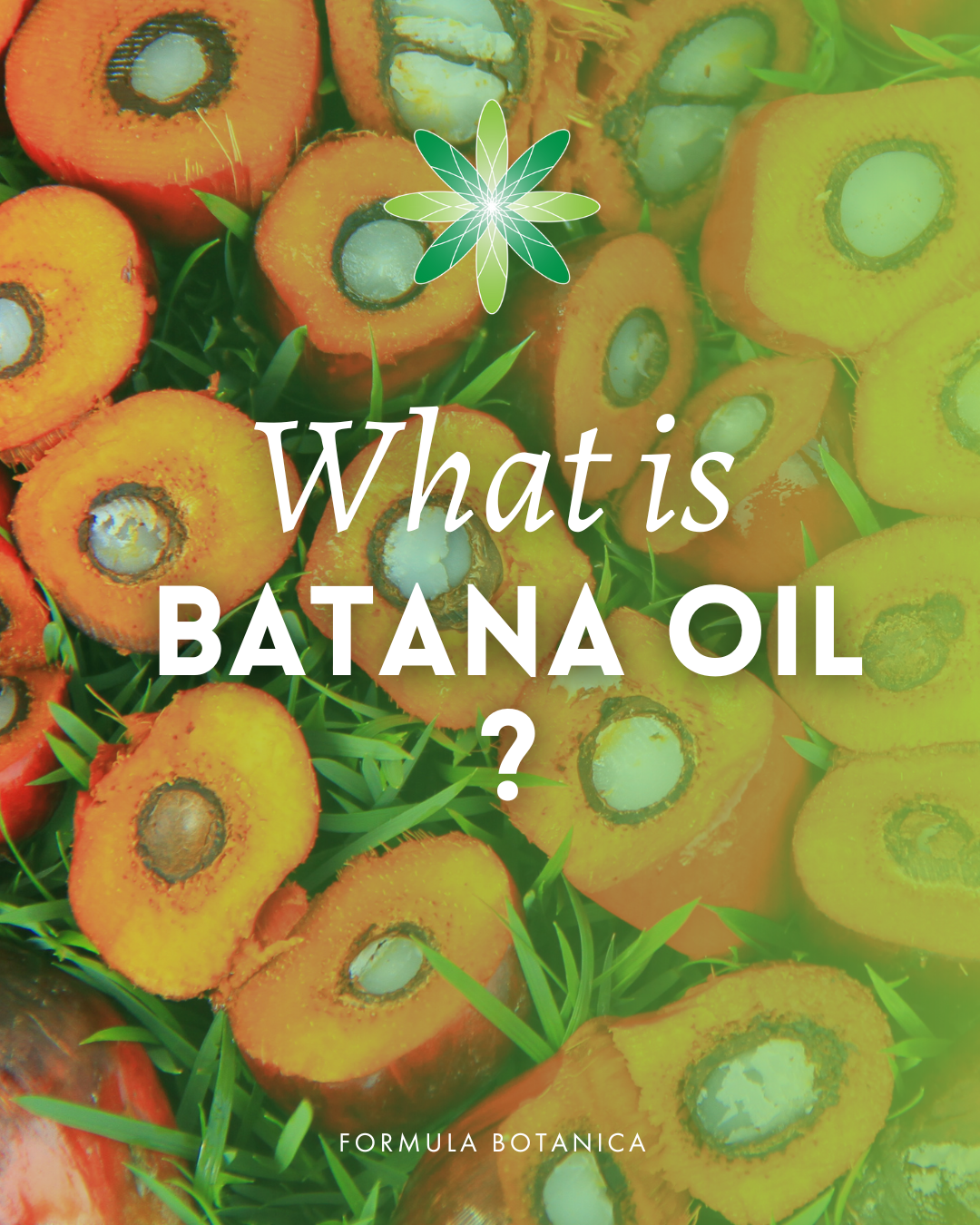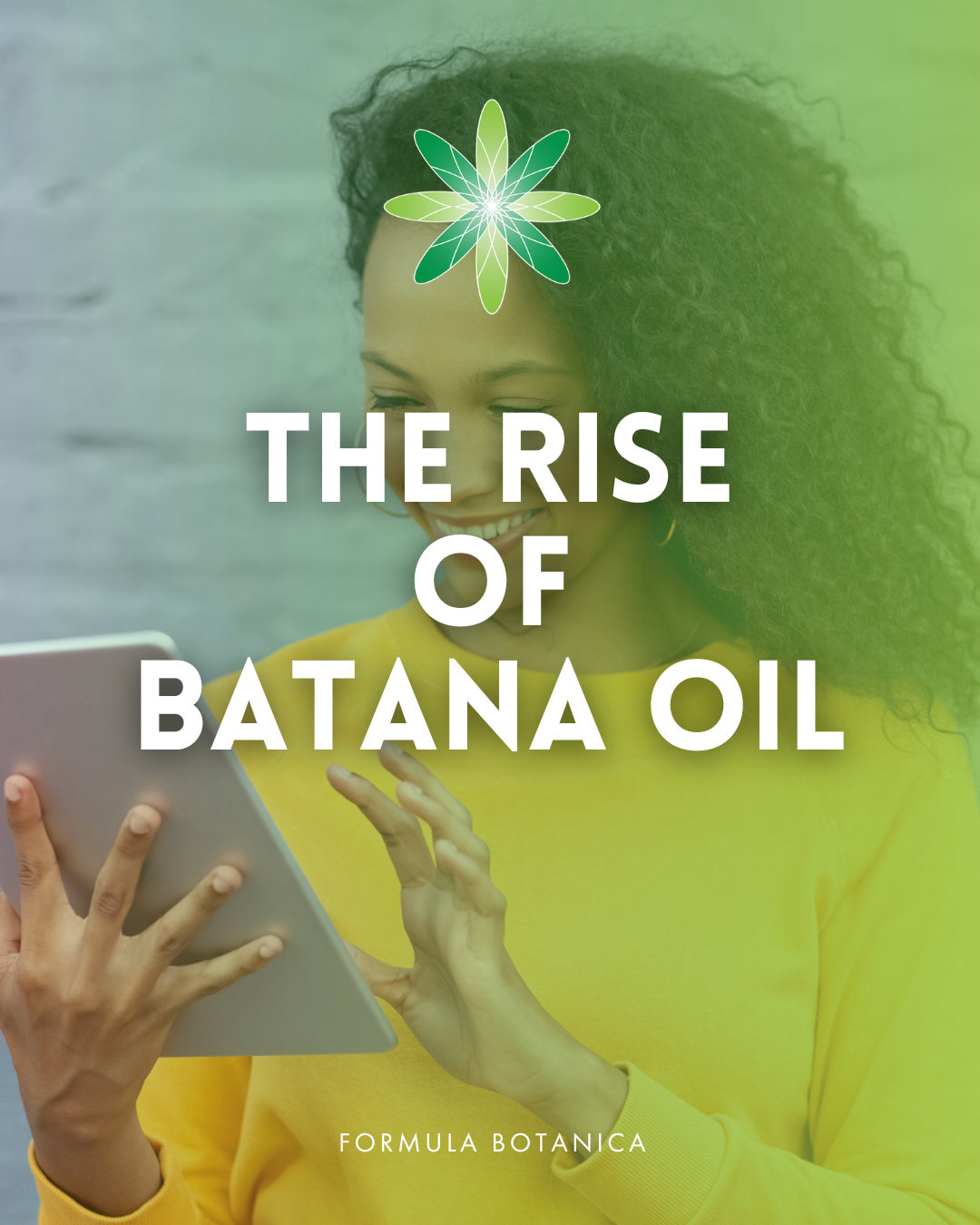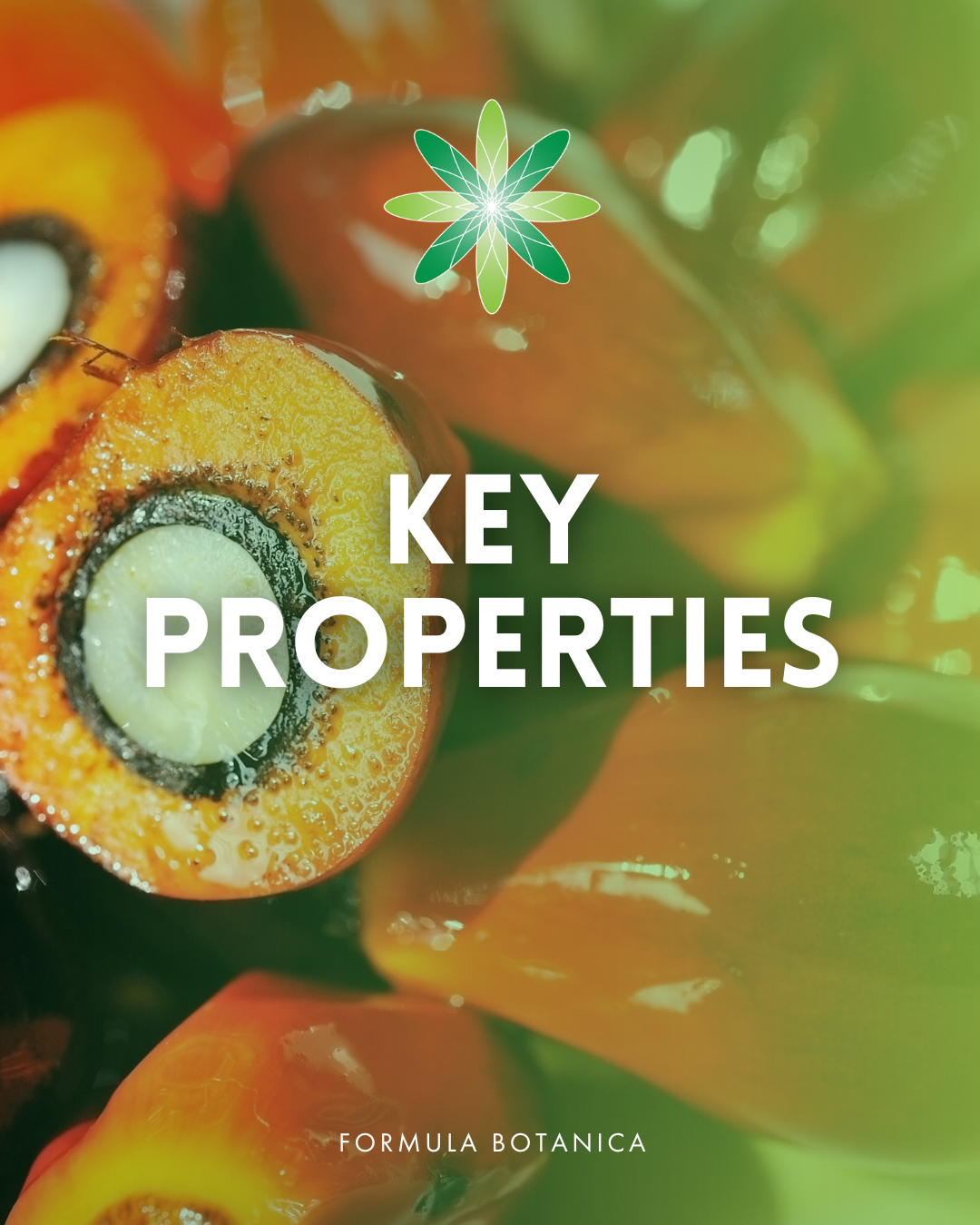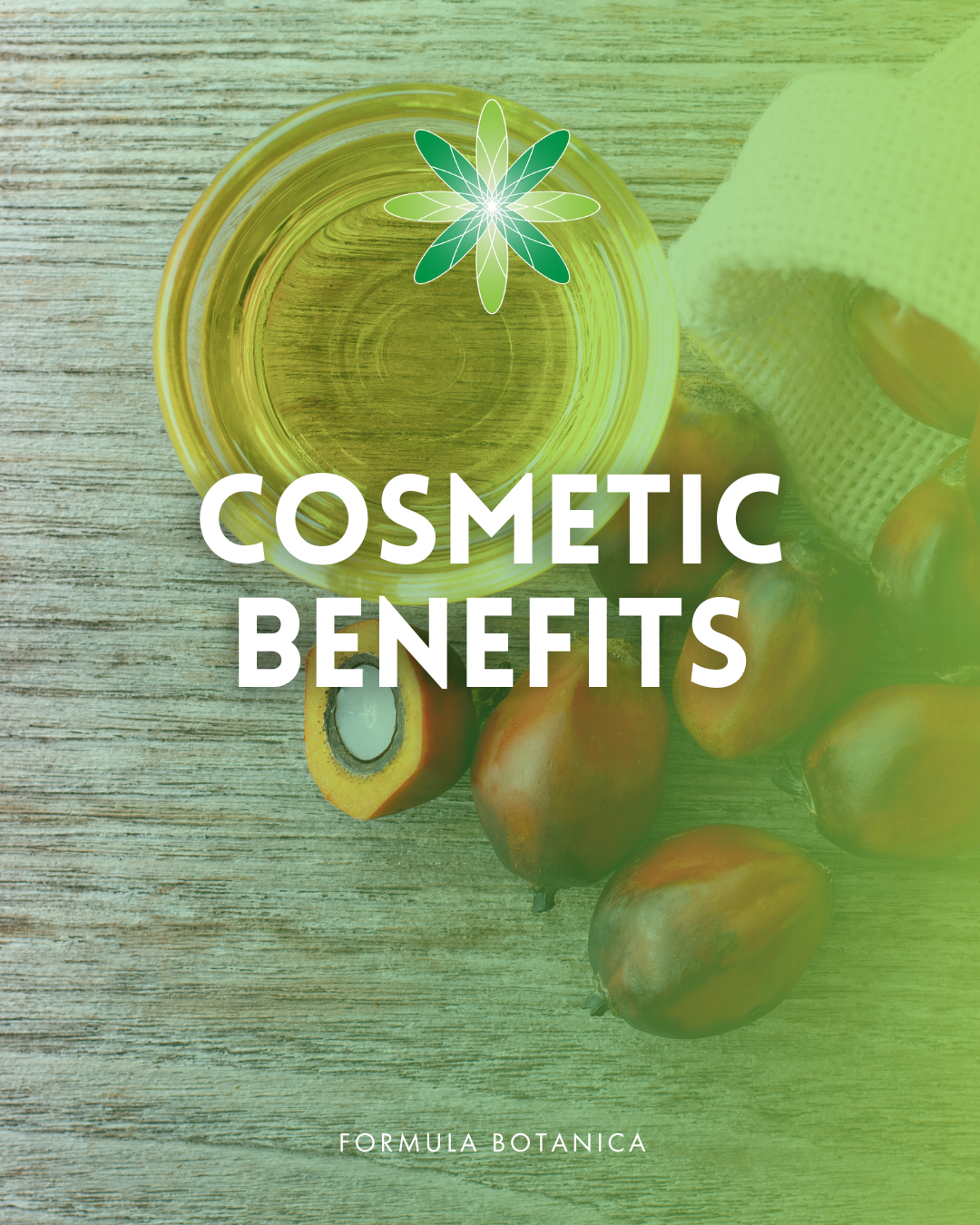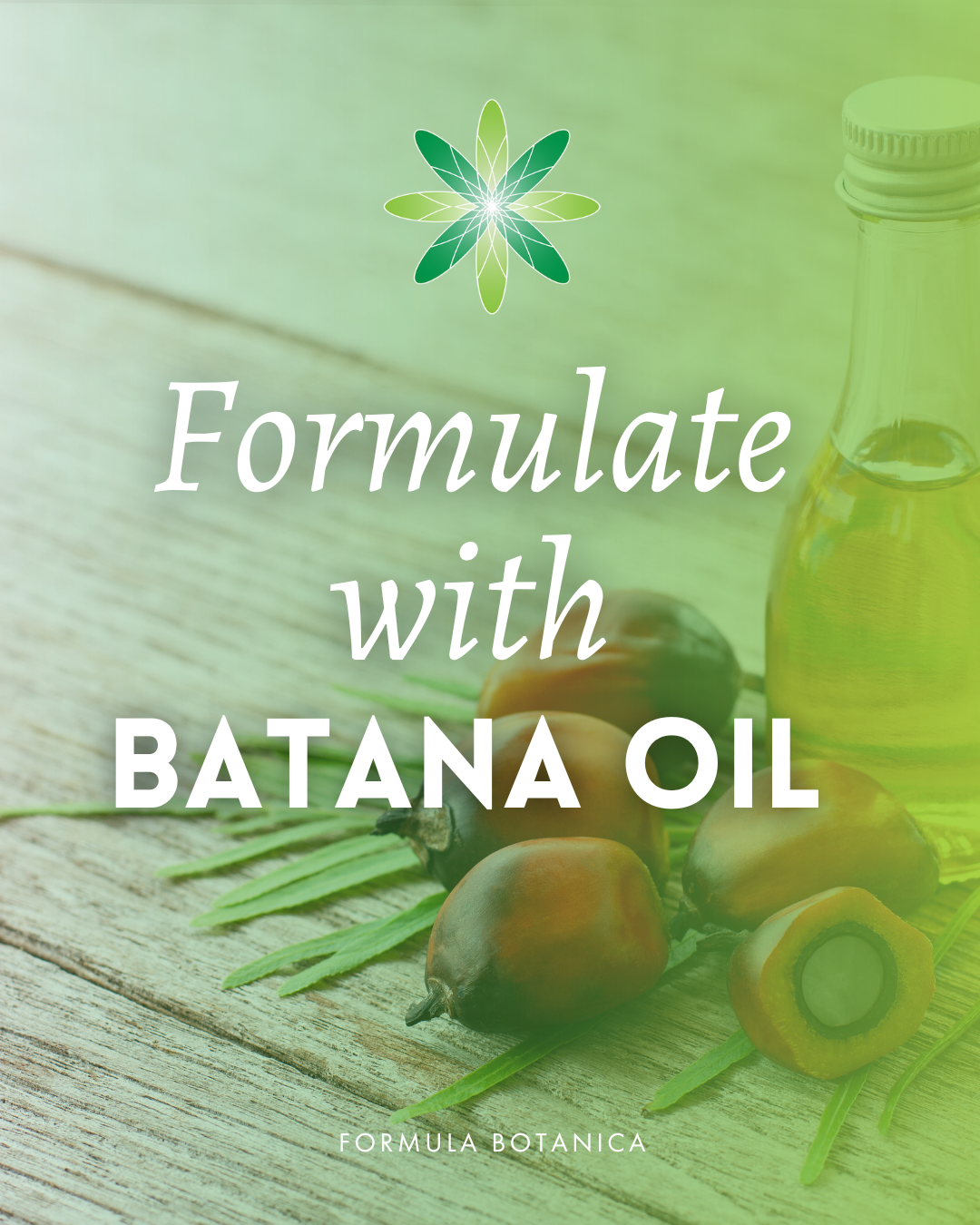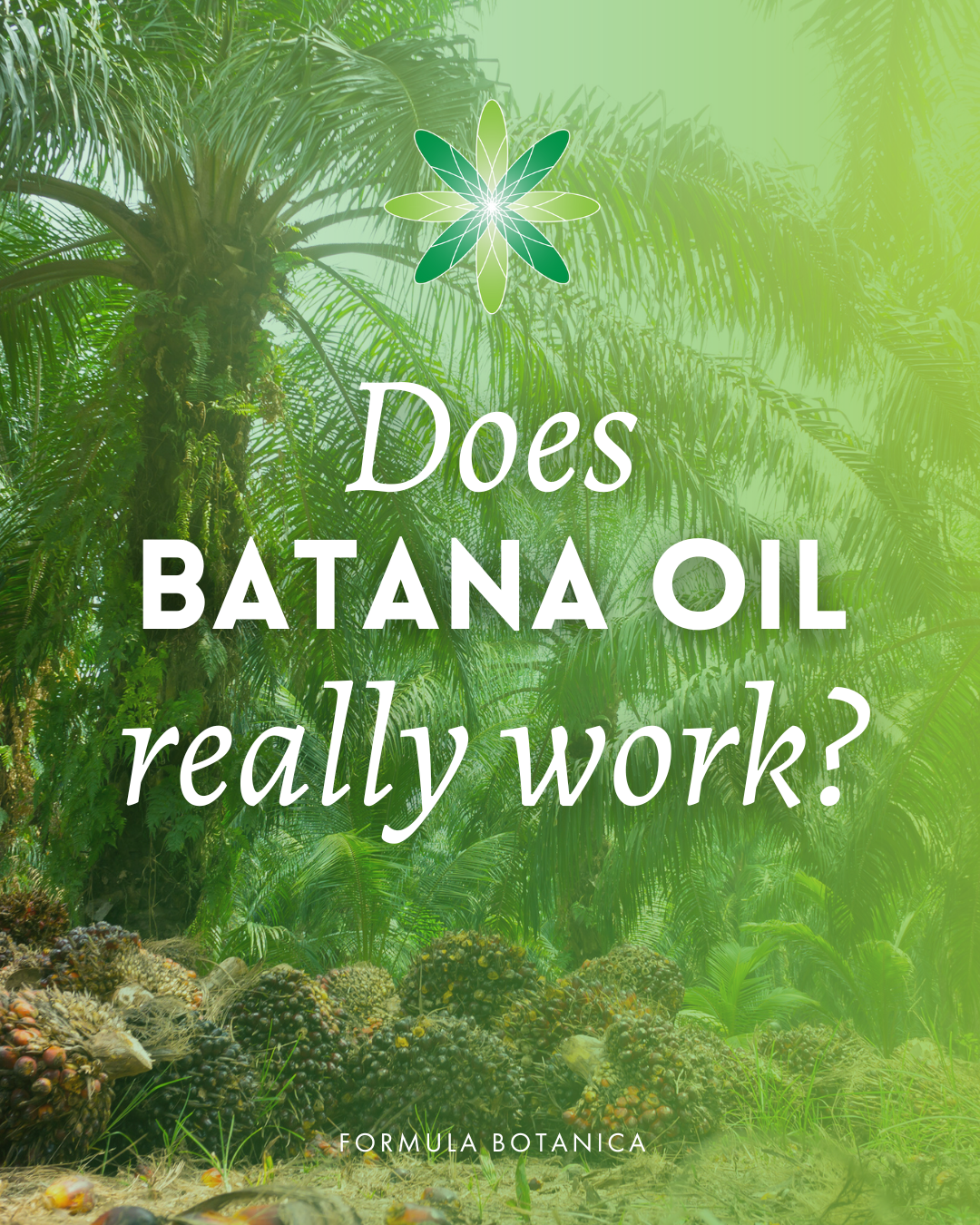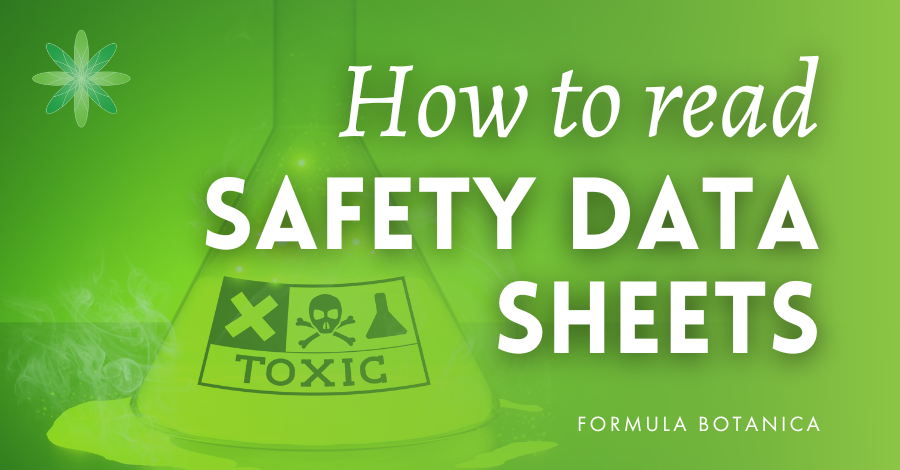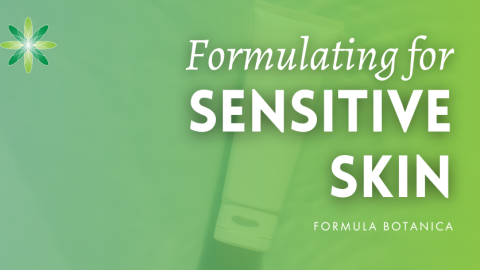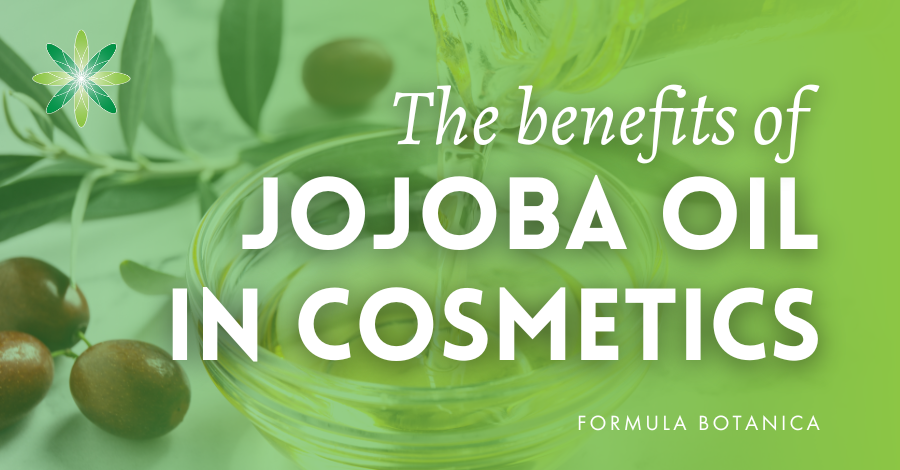Lately, I’ve been seeing batana oil everywhere. And I mean everywhere. From social media to beauty magazines and trade shows, it’s become almost impossible to avoid. Everyone seems to be talking about it and some even call it the new rosemary oil. Now, that’s a bold claim to make.
I’ll admit, I didn’t know much about batana oil. So naturally, as a cosmetic formulator and Formula Botanica’s Content Creator, I was intrigued. What was this viral oil everyone kept talking about? And did it actually do anything for your skin or hair? Were any of the hair growth claims legit and if so, was there any scientific evidence to back it up? And how could you use batana in your natural formulations?
Those questions sent me down a rabbit hole – and now, I’ve got the answers for you. In this post, I’m unpacking the science behind this so-called miracle oil and debunking quite a bit of misinformation along the way. Plus, I’ll show you how to add batana oil to your natural formulations. So get ready to uncover the real potential of batana oil. It’s not what you might expect.
What is batana oil?
INCI: Elaeis Oleifera Kernel Oil
Batana oil, also known as ojon oil, is a rare botanical oil extracted from the nuts of the American palm tree (Elaeis oleifera), native to Central and South America, specifically in Honduras and Nicaragua.
For centuries, the Miskito people of Honduras – also known as the Tawira, or “people of beautiful hair” – have used batana oil to nourish their skin and hair, crediting this “miracle oil” for their strong, shiny, and healthy hair. They’ve also traditionally used this oil to treat ailments such as stomach aches and ulcers (i).
Recently, batana oil has been trending in the beauty industry, mostly because of its viral popularity on TikTok. What was once a secret of indigenous communities is now being rediscovered and celebrated as a must-have ingredient in natural skincare and haircare. But what makes it so special, besides its cultural heritage?
Why is batana oil so popular?
These days, it’s nearly impossible to scroll through social media without seeing influencers raving about batana oil and sharing how they’ve added it to their haircare routines. Some are even calling it the new rosemary oil, claiming it can help regrow hair, soften strands, smooth split ends, and even reduce grey hairs.
Naturally, I was a bit sceptical. After all, as formulators, it’s our job to research ingredients, dig deep into claims, and separate fact from fiction. Take rosemary oil for example – it’s often lauded for promoting hair growth, but the science tells a different story. We’ve already debunked that myth in this article:
So, what about batana oil? Does it really live up to the hype, or is its popularity driven by something else?
While we’ll dive into the science behind this so-called miracle oil in the next sections, it’s already clear that batana oil owes much of its fame to a new wave of informed consumers. Consumers are now seeking natural solutions and prioritising scalp health as part of their beauty routines. We discuss this in this podcast episode:
Podcast 172: Skintellectuals and the rise of informed beauty shoppers
Key properties of batana oil
Now that you know why batana oil is trending, let’s take a closer look at its key properties and how it can benefit you as a formulator.
Batana oil is sourced primarily from Honduras, where it’s deeply rooted in the traditions of local communities. The extraction process is as fascinating as it is labour-intensive. It starts with boiling the fruit of the American palm tree and then pounding the pulp to remove the vibrant orange outer shell.
The nuts are then carefully washed, sun-dried, and cracked open using stones to reveal the kernels inside. Finally, the kernels are cooked over a fire to release the oil. This meticulous, mostly manual process makes batana oil a rare and precious ingredient.
The resulting oil is a striking red-orange with a nutty aroma, a testament to its raw and minimally processed nature. While refined versions exist, I recommend trying the unrefined version. Many natural formulators prefer unrefined botanical oils to fully take advantage of their properties and maximise their benefits. You can find out more about this fascinating topic below:
Also, if you use the unrefined version, you can add a nice red-orange tint to your formulations, and make them stand out. If you’re interested in natural colourants, check out this post:
And f you want to learn more about the benefits of botanical oils, why not check out our Botanical Oils Mini lab on our exclusive membership site, The Lab at Formula Botanica?
Cosmetic benefits of batana oil
Now, let’s get to the good part: the benefits of batana oil. Does batana oil actually live up to the hype? Is it worthy of being called the new rosemary oil? And, most importantly, is it worth your time as a formulator?
Here’s the truth: there are currently no conclusive clinical studies proving batana oil’s efficacy, and there’s no solid evidence linking it to hair growth.
But let’s be real – scientific research takes time, and just because something isn’t backed by studies yet doesn’t mean it’s not worth exploring. Batana oil has been a hidden gem for so long, and it’s finally getting the recognition it deserves. Here are a few of its benefits:
Nourishing:
Firstly, batana oil is packed with essential fatty acids, making it a powerhouse ingredient for nourishing hair and skin. In particular, it contains high levels of linoleic acid (omega-6) and oleic acid (omega-9), which are key in promoting healthy hair and skin. These omegas help seal in moisture, prevent dryness, and leave both skin and hair feeling hydrated and soft.
Batana oil also may help prevent transepidermal water loss (TEWL), making it perfect for maintaining moisture levels. Find out more about this topic below:
Antioxidant:
On top of that, batana oil is rich in antioxidants, including beta-carotene, alpha-tocopherol, and tocotrienols, which provide a healthy dose of vitamins A and E. These antioxidants protect hair and skin from environmental damage, improve texture, and boost moisture retention.
Vitamin E is especially beneficial – it helps repair hair damage, reduce split ends, and add shine. In skincare, it enhances elasticity, combats free radicals, slows the signs of ageing, and even prevents the oxidation of your botanical ingredients.
For more on antioxidants, check out our Antioxidant Mini Lab in The Lab at Formula Botanica.
So, while batana oil may not help with hair growth, its moisturising and antioxidant properties make it a fantastic ingredient to include in your natural skincare and haircare formulations.
How to formulate with batana oil
Now that you’re familiar with the properties and benefits of batana oil, you’re probably wondering how to add it to your natural formulations. And I can’t blame you! So here’s how you can formulate with batana oil:
Formulating with batana oil for skincare
Batana oil is a great addition to your skincare formulations, thanks to its antioxidant and nourishing properties.
It’s especially great in body butters, lotions, and massage oils – ideal for dry or mature skin. You can incorporate batana oil into the oil phase of your water-based formulations or blend it with other oils in your anhydrous (oil-based) products.
If you’re interested in learning how to create organic skincare from scratch instead of following online DIY recipes, check out our award-winning Diploma in Organic Skincare Formulation.
Formulating with batana oil for haircare
Batana oil is equally fantastic in haircare formulations like shampoos, conditioners, hair oils, and masks. Its rich, nourishing properties make it particularly beneficial for thicker or curly hair, providing deep hydration and strengthening the strands. It can also be used in products for finer hair – just adjust the quantities to avoid weighing it down.
You can blend batana oil directly into your haircare formulations, or use it on its own as a pre-shampoo treatment, leave-in conditioner, or hair mask.
If you’d like to learn how to formulate organic haircare, check out our comprehensive Diploma in Organic Haircare Formulation. You might also enjoy this post: How to make natural haircare products: a step-by-step guide.
Does batana oil really work?
As we wrap up this article, you might still be wondering: does batana oil really work? The answer, in short, is: it depends on what you’re hoping for.
Batana oil is packed with beneficial compounds – essential fatty acids, antioxidants, and vitamins – that contribute to its nourishing properties. However, there’s no research to support its claims regarding hair growth or the reduction of hair loss. These benefits remain largely anecdotal, as there are no clinical studies to back them up at this point.
That said, batana oil is far from ineffective. Its deeply nourishing qualities can condition the hair, lock in moisture, and promote overall scalp health. These benefits may lead to healthier, shinier, and more resilient hair. It’s also an excellent option for addressing dryness, breakage, and dullness. Its antioxidant properties also help restore skin elasticity, improve hydration, and reduce dryness.
Of course, batana oil is not your only option. You could use other oils, such as sage oil, prickly pear, ginger oil, rosemary oil, castor oil, olive oil, tea tree oil, and coconut oil, which are also very trendy right now. Here are a few options for you to explore:
Top 10 botanical oils every formulator needs
So, while batana oil may not be a miracle ingredient or the new rosemary oil, and more research is definitely needed, it’s still a fantastic addition to your skincare and haircare formulations.
FAQ
What is batana oil good for?
Batana oil is a rare oil rich in fatty acids, including oleic acid, palmitic acid, linoleic acid, and stearic acid, which can help nourish and strengthen your hair and scalp. It’s also packed with antioxidants, which help protect your skin from free radicals and fight the signs of premature ageing. Additionally, batana oil may improve skin elasticity and hydration, and reduce dryness, making it a versatile ingredient for both your skincare and haircare formulations.
Does batana oil help with hair growth or hair loss?
No, it does not. Currently, there is no clinical evidence that batana oil can help with hair growth. However, it has other benefits. Batana oil is rich in essential fatty acids and antioxidants, which may help reduce scalp dryness and make your hair feel more nourished over time.
What’s the difference between batana and palm oil?
Batana oil and palm oil both come from palm tree species, but they differ significantly in their sources and properties. Batana oil is derived from the nuts of the Elaeis oleifera tree (American palm oil), primarily found in Central and South America, and is known for its rich content of essential fatty acids, antioxidants, and vitamins that promote hair and skin health. It has a darker colour and a thicker, more nourishing consistency compared to palm oil. On the other hand, palm oil is extracted from the fruit of the Elaeis guineensis (African palm oil), and is commonly used in both food products and cosmetics worldwide.
How to use batana oil?
You can use batana oil directly on your hair or add it as a cosmetic ingredient to your skincare or haircare formulations. It is very stable so you can add it to the heated oil phase of your water-based formulations, or simply add it to your anhydrous (oil-based) formulations.
Learn how to formulate with botanical oils
If you enjoyed this article, you might want to explore other oils and learn how to formulate with them. Our blog is packed with free resources to guide you, but if you’re ready to expand your knowledge, I suggest you check out our free mini-course in cosmetic formulation.
In this short course, you’ll learn how to formulate safe and effective natural skincare from the comfort of your home, using precious botanical oils like batana oil, and discover how fun it is to become a cosmetic formulator. I can’t wait to see you there!
References & further reading
(i) Reddy et al, 2019. Indigenous Traditional Knowledge on Health and Equitable Benefits of Oil Palm (Elaeis spp.)
Leave us a comment

Ariane is Formula Botanica’s Content Creator and an active member of the student community. She has worked as a professional journalist, blogger, copywriter and editor before joining Formula Botanica full-time in 2024.

